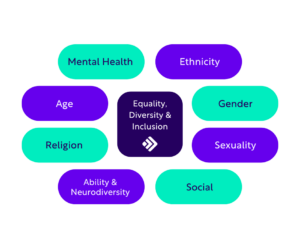What are we doing at Chorus?
We’ve worked very hard to create an equal, diverse, and inclusive culture at Chorus, but we know there is more we can do and will keep striving to be the best we can be.
To support this, we ensure ED&I is on the agenda or every board and executive meeting, with a dedicated ED&I committee which provides a steering group and chairperson to lead our efforts and help define our ED&I strategy, initiatives, and roadmap. We also provide training to managers, to help them support their teams.
Employees also have the option to act as ‘champions’ within the business for specific areas of ED&I. These individuals often take a lead on circulating updates, information, and resources around their topic, run company-wide ‘lunch and learns’, and also act as a point of contact for anyone with questions or needing support.
These meetings also allow us to discuss the latest topics in ED&I, as well as enabling us to plan for key upcoming religious holidays, or celebratory events such as Pride, Black History month, Mental Health week, International Women’s Day, ADHD Awareness and many more.

